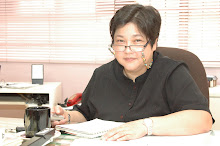Health Care For All Filipinos
Sylvia Estrada Claudio
If I were the President, conditional cash transfers or CCT's would not be my flagship program. I would instead work on universal health care.
I know, I know. I am not the President. I am also not so arrogant as to presume to give Pnoy unsolicited advise or bad-mouth Sec. Dinky's thing. This is not about the pros and cons of the CCT, a subject that deserves it own Yellow Pad column.
But universal health care (UHC) is one of my hobby horses. It has been on my mind for the past year for several reasons, one of which is that Dr. Alberto Romualdez and a group of colleagues from UP Manila, put together a task force for the Centennial Lecture Series of the University of the Philippines and came up with a blueprint for UHC. The task force's output is exciting because it is straightforward in its proposal that we can achieve health care for all in a relatively short period of time.
According to the NSCB, our country's total health expenditure reached P180.8 billion in 2005
Using this figure the task force proposes that around 80 to 120 B pesos would be needed to achieve health care for all. The task force also proposes several funding mechanisms such as quantum increases in tax-based government spending, national government-tax increases, reallocations, local government-mandatory increases in proportion spent on health and significant increases in public health insurance support value for basic services. AER head honcho Men Sta. Ana, who I asked late last year, also thinks that sin tax increases and foreign borrowings could be tapped as well. It tickles my iconoclastic soul that activists like us would actually approve of foreign debt. But, many of us have always argued that debt that truly benefits the people would not be bad debt.
Thailand is an excellent source of inspiration. It's total health expenditures for the year 2007 are slightly less than the Philippines. Yet it has achieved universal health care. WHO statistics show that the Thai government provided for 73% of all health expenditures while the Philippine government provided only 35%. Simply put, Filipinos are paying for their own health care out of their own pockets. Naturally, the health statistics for Thailand are so much better.
Thailand achieved its universal health coverage over a period of years through a multi-pronged approach that involved, among other things, local-level initiatives.
So, I nagged another good friend, Dr. Dennis Batangan to work out a pilot program for UP Diliman. It is my dream to start piloting for universal coverage, so I thought this should happen in the place where I work.
What Dr. Batangan and I propose is to start a demand-driven and insurance linked health benefits project for UP Diliman. It begins simply as an information management system and health insurance project intended to expand the access of the UP Diliman Community to available health benefits. It aims to consolidate available information on health-related benefits intended for various sectors of the UP Diliman community and expand access to these benefits through demand-driven mechanisms and social health insurance schemes.
This is a first step towards ensuring equity in health benefits for all sectors of the UP Diliman community. It will also serve as a pilot effort towards universal health care coverage.
The project will be implemented in four phases namely: 1) a policy engagement phase. to ensure the commitment and support of the highest level of authority in the UP Diliman Community, the Board of Regents and the Barangay UP Campus officials; 2) a data integration phase that includes the designing of the data framework and capture forms to consolidate the available health benefits and insurance information for employees, students and community residents participating in the project. The data framework will also attempt to capture current demand for health services for the stakeholders concerned as well as health expenditures per capita and for UP Diliman as a whole; 3) a network expansion phase that involves the development of a directory for and organizing into a network of the health service providers the psychosocial , biomedical and alternative health service providers in the community. The information gathered from the network will be made available to the UP community through an internet portal and/or SMS services and; 4) a benefits convergence and development phase where institutions and organizations offering health related benefits will be guided on the process of converging or integrating their benefits for same beneficiaries and improving efficiency in the provision of these benefits. At the same time, new benefit packages for health related or psychosocial services will be developed or expanded for the benefit of the community.
The goal of the project for UP Diliman employees, students and community members have easy access to consolidated information on health related benefits they can avail of in times of need. In the process, the beneficiaries will also be provided inputs on how to expand the health benefits they are currently receiving through social health insurance schemes and development of other demand side benefits.
So, if I promise, promise, promise to cooperate with Pnoy's CCTs, can he spare me a bit of change to begin piloting universal health care in UP Diliman?
(Sylvia Estrada Claudio is a doctor of medicine and a PhD in psychology. When she is not attempting political trade-offs for her hobby horses, she teaches Women and Development Studies at the University of the Philippines in Diliman. She is a fellow of AER.)
Is an Anti-Choice Clinic Using ‘Unlawful Imprisonment’ as Company Policy?
-
Those familiar with the tactics employed at anti-choice pregnancy clinics
say they're not surprised by a recent Reddit post from a clinic worker.
The po...
6 years ago


No comments:
Post a Comment